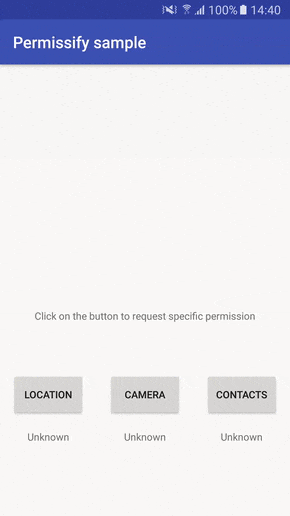Permissify - Simplifying Android Permissions
Permissify is an Android library that makes requesting permissions at runtime much easier.
Android Marshmallow added a new functionality to let users grant permissions when running an app instead of granting them all when installing it. This approach gives the user more control but requires developers to add lots of boilerplate code to support it.
Overview
- Tested in production - over 1000 000 installs in the Holidaycheck app
- Handles showing Rationale & Permission denied dialogs
- Consistent API across android versions
- Perfectly fine with configuration changes
- API for activity and fragment
- Works great without hacking android
- No memory leaks guaranteed
- Supports Android 15+
Screenshots
Add it to your project
Include the library in your build.gradle
dependencies{
compile 'com.holidaycheck:permissify:1.0.0'
}
or to your pom.xml if you are using Maven
<dependency>
<groupId>com.holidaycheck</groupId>
<artifactId>permissify</artifactId>
<version>1.0.0</version>
<type>aar</type> </dependency> Configuration
To start using the library you need to extend your activity from PermissifyActivity and configure library in your custom android.app.Application.
Minimum configuration to run is presented below. You basically need to provide translations for every Permission group that is used in your app.
public class Application extends android.app.Application {
@Override
public void onCreate() {
super.onCreate();
PermissifyConfig permissifyConfig = new PermissifyConfig.Builder()
.withDefaultTextForPermissions(new HashMap<String, DialogText>() {
{
put(Manifest.permission_group.LOCATION, new DialogText(R.string.location_rationale, R.string.location_deny_dialog));
put(Manifest.permission_group.CAMERA, new DialogText(R.string.camera_rationale, R.string.camera_deny_dialog));
}
}
)
.build();
PermissifyConfig.initDefault(permissifyConfig);
}
}
Full configuration looks like this, but mostly you will use minimum config. You can customize default options for every permission call, and dialogs appearance. See javadoc for more details.
PermissifyConfig permissifyConfig = new PermissifyConfig.Builder()
.withDefaultPermissionCallOptions(
new PermissionCallOptions.Builder()
.withDefaultDenyDialog(true)
.withDefaultRationaleDialog(true)
.withDefaultRationaleDialog(R.string.default_rationale_dialog_text)
.withDenyDialogMsg(R.string.default_deny_dialog_text)
.withRationaleEnabled(true)
.build()
)
.withDefaultTextForPermissions(new HashMap<String, DialogText>() {
{
put(Manifest.permission_group.LOCATION, new DialogText(R.string.location_rationale, R.string.location_deny_dialog));
put(Manifest.permission_group.CAMERA, new DialogText(R.string.camera_rationale, R.string.camera_deny_dialog));
}
}
)
.withPermissionTextFallback(new DialogText(R.string.fallback_rationale_dialog_text, R.string.fallback_deny_dialog_text))
.withDialogRationaleDialogFactory(new PermissifyConfig.AlertDialogFactory() {
@Override
public AlertDialog createDialog(Context context, String dialogMsg, DialogInterface.OnClickListener onClickListener) {
return new CustomRationaleDialog(context, dialogMsg, onClickListener);
}
}
)
.withDenyDialogFactory(new PermissifyConfig.AlertDialogFactory() {
@Override
public AlertDialog createDialog(Context context, String dialogMsg, DialogInterface.OnClickListener onClickListener) {
return new CustomDenyDialog(context, dialogMsg, onClickListener);
}
}
)
.build();
PermissifyConfig.initDefault(permissifyConfig);
Usage
To request specific permission you need make a call to PermissifyManager. Every call is associated with your unique RequestId.
getPermissifyManager().callWithPermission(this, LOCATION_PERMISSION_REQUEST_ID, android.Manifest.permission.ACCESS_FINE_LOCATION);
the result and the current permission status is provided via
@Override public void onCallWithPermissionResult(int callId, PermissifyManager.CallRequestStatus status) {
if (callId == LOCATION_PERMISSION_REQUEST_ID) {
switch (status) {
case PERMISSION_GRANTED:
getUserLocation();
break
case PERMISSION_DENIED_ONCE:
//do some custom logic
break;
case PERMISSION_DENIED_FOREVER:
//do some custom logic
case SHOW_PERMISSION_RATIONALE:
//do some custom logic
}
}
}
If you want to request permission from a fragment make sure it implements PermissifyManager.Callback
There are two types of dialogs:
- Rationale dialog - is shown in situations where the user might need an explanation why the app needs this permission
- Deny dialog - is shown when the user permanently denied requested permission
There are number of options that you can change when requesting for permission using additional parameter:
getPermissifyManager().callWithPermission(this, LOCATION_PERMISSION_REQUEST_ID, android.Manifest.permission.ACCESS_FINE_LOCATION,
new PermissionCallOptions.Builder()
.withDefaultDenyDialog(false)
.withRationaleEnabled(false)
.build());
Current limitations
- Multiple permission request at once is not currently supported (will be added soon)
Do you want to contribute?
Feel free to add any cool and useful feature to the library.
License
The MIT License (MIT) Copyright (c) 2016 HolidayCheck Permission is hereby granted, free of charge, to any person obtaining a copy of this software and associated documentation files (the "Software"), to deal in the Software without restriction, including without limitation the rights to use, copy, modify, merge, publish, distribute, sublicense, and/or sell copies of the Software, and to permit persons to whom the Software is furnished to do so, subject to the following conditions: The above copyright notice and this permission notice shall be included in all copies or substantial portions of the Software. THE SOFTWARE IS PROVIDED "AS IS", WITHOUT WARRANTY OF ANY KIND, EXPRESS OR IMPLIED, INCLUDING BUT NOT LIMITED TO THE WARRANTIES OF MERCHANTABILITY, FITNESS FOR A PARTICULAR PURPOSE AND NONINFRINGEMENT. IN NO EVENT SHALL THE AUTHORS OR COPYRIGHT HOLDERS BE LIABLE FOR ANY CLAIM, DAMAGES OR OTHER LIABILITY, WHETHER IN AN ACTION OF CONTRACT, TORT OR OTHERWISE, ARISING FROM, OUT OF OR IN CONNECTION WITH THE SOFTWARE OR THE USE OR OTHER DEALINGS IN THE SOFTWARE. 